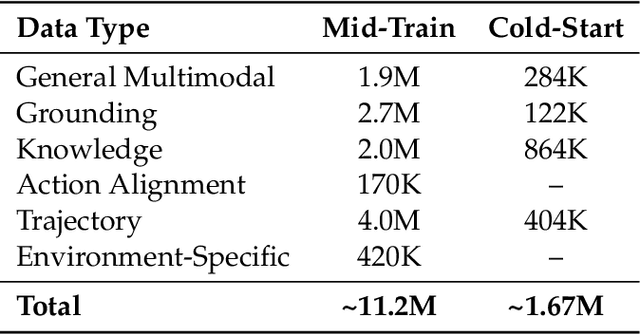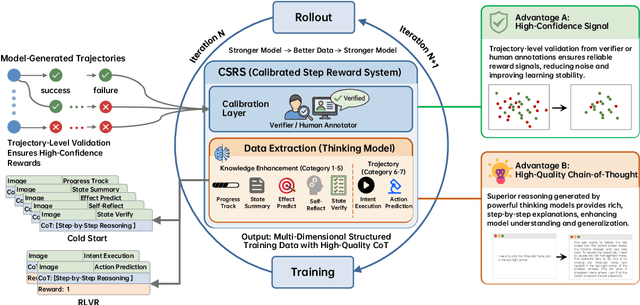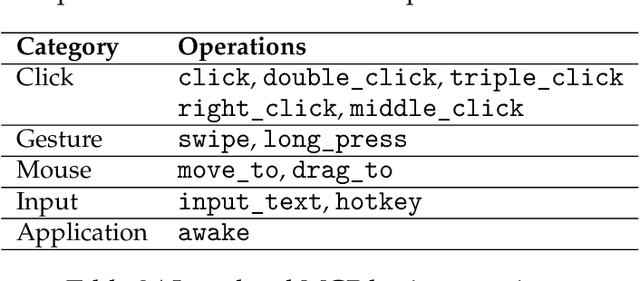Hang Li
NEC Corporation
InternVLA-A1: Unifying Understanding, Generation and Action for Robotic Manipulation
Jan 05, 2026Abstract:Prevalent Vision-Language-Action (VLA) models are typically built upon Multimodal Large Language Models (MLLMs) and demonstrate exceptional proficiency in semantic understanding, but they inherently lack the capability to deduce physical world dynamics. Consequently, recent approaches have shifted toward World Models, typically formulated via video prediction; however, these methods often suffer from a lack of semantic grounding and exhibit brittleness when handling prediction errors. To synergize semantic understanding with dynamic predictive capabilities, we present InternVLA-A1. This model employs a unified Mixture-of-Transformers architecture, coordinating three experts for scene understanding, visual foresight generation, and action execution. These components interact seamlessly through a unified masked self-attention mechanism. Building upon InternVL3 and Qwen3-VL, we instantiate InternVLA-A1 at 2B and 3B parameter scales. We pre-train these models on hybrid synthetic-real datasets spanning InternData-A1 and Agibot-World, covering over 533M frames. This hybrid training strategy effectively harnesses the diversity of synthetic simulation data while minimizing the sim-to-real gap. We evaluated InternVLA-A1 across 12 real-world robotic tasks and simulation benchmark. It significantly outperforms leading models like pi0 and GR00T N1.5, achieving a 14.5\% improvement in daily tasks and a 40\%-73.3\% boost in dynamic settings, such as conveyor belt sorting.
GR-Dexter Technical Report
Dec 30, 2025Abstract:Vision-language-action (VLA) models have enabled language-conditioned, long-horizon robot manipulation, but most existing systems are limited to grippers. Scaling VLA policies to bimanual robots with high degree-of-freedom (DoF) dexterous hands remains challenging due to the expanded action space, frequent hand-object occlusions, and the cost of collecting real-robot data. We present GR-Dexter, a holistic hardware-model-data framework for VLA-based generalist manipulation on a bimanual dexterous-hand robot. Our approach combines the design of a compact 21-DoF robotic hand, an intuitive bimanual teleoperation system for real-robot data collection, and a training recipe that leverages teleoperated robot trajectories together with large-scale vision-language and carefully curated cross-embodiment datasets. Across real-world evaluations spanning long-horizon everyday manipulation and generalizable pick-and-place, GR-Dexter achieves strong in-domain performance and improved robustness to unseen objects and unseen instructions. We hope GR-Dexter serves as a practical step toward generalist dexterous-hand robotic manipulation.
Step-GUI Technical Report
Dec 19, 2025



Abstract:Recent advances in multimodal large language models unlock unprecedented opportunities for GUI automation. However, a fundamental challenge remains: how to efficiently acquire high-quality training data while maintaining annotation reliability? We introduce a self-evolving training pipeline powered by the Calibrated Step Reward System, which converts model-generated trajectories into reliable training signals through trajectory-level calibration, achieving >90% annotation accuracy with 10-100x lower cost. Leveraging this pipeline, we introduce Step-GUI, a family of models (4B/8B) that achieves state-of-the-art GUI performance (8B: 80.2% AndroidWorld, 48.5% OSWorld, 62.6% ScreenShot-Pro) while maintaining robust general capabilities. As GUI agent capabilities improve, practical deployment demands standardized interfaces across heterogeneous devices while protecting user privacy. To this end, we propose GUI-MCP, the first Model Context Protocol for GUI automation with hierarchical architecture that combines low-level atomic operations and high-level task delegation to local specialist models, enabling high-privacy execution where sensitive data stays on-device. Finally, to assess whether agents can handle authentic everyday usage, we introduce AndroidDaily, a benchmark grounded in real-world mobile usage patterns with 3146 static actions and 235 end-to-end tasks across high-frequency daily scenarios (8B: static 89.91%, end-to-end 52.50%). Our work advances the development of practical GUI agents and demonstrates strong potential for real-world deployment in everyday digital interactions.
Kling-Omni Technical Report
Dec 18, 2025



Abstract:We present Kling-Omni, a generalist generative framework designed to synthesize high-fidelity videos directly from multimodal visual language inputs. Adopting an end-to-end perspective, Kling-Omni bridges the functional separation among diverse video generation, editing, and intelligent reasoning tasks, integrating them into a holistic system. Unlike disjointed pipeline approaches, Kling-Omni supports a diverse range of user inputs, including text instructions, reference images, and video contexts, processing them into a unified multimodal representation to deliver cinematic-quality and highly-intelligent video content creation. To support these capabilities, we constructed a comprehensive data system that serves as the foundation for multimodal video creation. The framework is further empowered by efficient large-scale pre-training strategies and infrastructure optimizations for inference. Comprehensive evaluations reveal that Kling-Omni demonstrates exceptional capabilities in in-context generation, reasoning-based editing, and multimodal instruction following. Moving beyond a content creation tool, we believe Kling-Omni is a pivotal advancement toward multimodal world simulators capable of perceiving, reasoning, generating and interacting with the dynamic and complex worlds.
Improved Physics-Driven Neural Network to Solve Inverse Scattering Problems
Dec 10, 2025Abstract:This paper presents an improved physics-driven neural network (IPDNN) framework for solving electromagnetic inverse scattering problems (ISPs). A new Gaussian-localized oscillation-suppressing window (GLOW) activation function is introduced to stabilize convergence and enable a lightweight yet accurate network architecture. A dynamic scatter subregion identification strategy is further developed to adaptively refine the computational domain, preventing missed detections and reducing computational cost. Moreover, transfer learning is incorporated to extend the solver's applicability to practical scenarios, integrating the physical interpretability of iterative algorithms with the real-time inference capability of neural networks. Numerical simulations and experimental results demonstrate that the proposed solver achieves superior reconstruction accuracy, robustness, and efficiency compared with existing state-of-the-art methods.
The best performance in the CARE 2025 -- Liver Task (LiSeg-Contrast): Contrast-Aware Semi-Supervised Segmentation with Domain Generalization and Test-Time Adaptation
Oct 05, 2025



Abstract:Accurate liver segmentation from contrast-enhanced MRI is essential for diagnosis, treatment planning, and disease monitoring. However, it remains challenging due to limited annotated data, heterogeneous enhancement protocols, and significant domain shifts across scanners and institutions. Traditional image-to-image translation frameworks have made great progress in domain generalization, but their application is not straightforward. For example, Pix2Pix requires image registration, and cycle-GAN cannot be integrated seamlessly into segmentation pipelines. Meanwhile, these methods are originally used to deal with cross-modality scenarios, and often introduce structural distortions and suffer from unstable training, which may pose drawbacks in our single-modality scenario. To address these challenges, we propose CoSSeg-TTA, a compact segmentation framework for the GED4 (Gd-EOB-DTPA enhanced hepatobiliary phase MRI) modality built upon nnU-Netv2 and enhanced with a semi-supervised mean teacher scheme to exploit large amounts of unlabeled volumes. A domain adaptation module, incorporating a randomized histogram-based style appearance transfer function and a trainable contrast-aware network, enriches domain diversity and mitigates cross-center variability. Furthermore, a continual test-time adaptation strategy is employed to improve robustness during inference. Extensive experiments demonstrate that our framework consistently outperforms the nnU-Netv2 baseline, achieving superior Dice score and Hausdorff Distance while exhibiting strong generalization to unseen domains under low-annotation conditions.
AgentRec: Next-Generation LLM-Powered Multi-Agent Collaborative Recommendation with Adaptive Intelligence
Oct 02, 2025Abstract:Interactive conversational recommender systems have gained significant attention for their ability to capture user preferences through natural language interactions. However, existing approaches face substantial challenges in handling dynamic user preferences, maintaining conversation coherence, and balancing multiple ranking objectives simultaneously. This paper introduces AgentRec, a next-generation LLM-powered multi-agent collaborative recommendation framework that addresses these limitations through hierarchical agent networks with adaptive intelligence. Our approach employs specialized LLM-powered agents for conversation understanding, preference modeling, context awareness, and dynamic ranking, coordinated through an adaptive weighting mechanism that learns from interaction patterns. We propose a three-tier learning strategy combining rapid response for simple queries, intelligent reasoning for complex preferences, and deep collaboration for challenging scenarios. Extensive experiments on three real-world datasets demonstrate that AgentRec achieves consistent improvements over state-of-the-art baselines, with 2.8\% enhancement in conversation success rate, 1.9\% improvement in recommendation accuracy (NDCG@10), and 3.2\% better conversation efficiency while maintaining comparable computational costs through intelligent agent coordination.
LLM4Rec: Large Language Models for Multimodal Generative Recommendation with Causal Debiasing
Oct 02, 2025Abstract:Contemporary generative recommendation systems face significant challenges in handling multimodal data, eliminating algorithmic biases, and providing transparent decision-making processes. This paper introduces an enhanced generative recommendation framework that addresses these limitations through five key innovations: multimodal fusion architecture, retrieval-augmented generation mechanisms, causal inference-based debiasing, explainable recommendation generation, and real-time adaptive learning capabilities. Our framework leverages advanced large language models as the backbone while incorporating specialized modules for cross-modal understanding, contextual knowledge integration, bias mitigation, explanation synthesis, and continuous model adaptation. Extensive experiments on three benchmark datasets (MovieLens-25M, Amazon-Electronics, Yelp-2023) demonstrate consistent improvements in recommendation accuracy, fairness, and diversity compared to existing approaches. The proposed framework achieves up to 2.3% improvement in NDCG@10 and 1.4% enhancement in diversity metrics while maintaining computational efficiency through optimized inference strategies.
Exploring Solution Divergence and Its Effect on Large Language Model Problem Solving
Sep 26, 2025Abstract:Large language models (LLMs) have been widely used for problem-solving tasks. Most recent work improves their performance through supervised fine-tuning (SFT) with labeled data or reinforcement learning (RL) from task feedback. In this paper, we study a new perspective: the divergence in solutions generated by LLMs for a single problem. We show that higher solution divergence is positively related to better problem-solving abilities across various models. Based on this finding, we propose solution divergence as a novel metric that can support both SFT and RL strategies. We test this idea on three representative problem domains and find that using solution divergence consistently improves success rates. These results suggest that solution divergence is a simple but effective tool for advancing LLM training and evaluation.
Kwai Keye-VL Technical Report
Jul 02, 2025Abstract:While Multimodal Large Language Models (MLLMs) demonstrate remarkable capabilities on static images, they often fall short in comprehending dynamic, information-dense short-form videos, a dominant medium in today's digital landscape. To bridge this gap, we introduce \textbf{Kwai Keye-VL}, an 8-billion-parameter multimodal foundation model engineered for leading-edge performance in short-video understanding while maintaining robust general-purpose vision-language abilities. The development of Keye-VL rests on two core pillars: a massive, high-quality dataset exceeding 600 billion tokens with a strong emphasis on video, and an innovative training recipe. This recipe features a four-stage pre-training process for solid vision-language alignment, followed by a meticulous two-phase post-training process. The first post-training stage enhances foundational capabilities like instruction following, while the second phase focuses on stimulating advanced reasoning. In this second phase, a key innovation is our five-mode ``cold-start'' data mixture, which includes ``thinking'', ``non-thinking'', ``auto-think'', ``think with image'', and high-quality video data. This mixture teaches the model to decide when and how to reason. Subsequent reinforcement learning (RL) and alignment steps further enhance these reasoning capabilities and correct abnormal model behaviors, such as repetitive outputs. To validate our approach, we conduct extensive evaluations, showing that Keye-VL achieves state-of-the-art results on public video benchmarks and remains highly competitive on general image-based tasks (Figure 1). Furthermore, we develop and release the \textbf{KC-MMBench}, a new benchmark tailored for real-world short-video scenarios, where Keye-VL shows a significant advantage.
 Add to Chrome
Add to Chrome Add to Firefox
Add to Firefox Add to Edge
Add to Edge